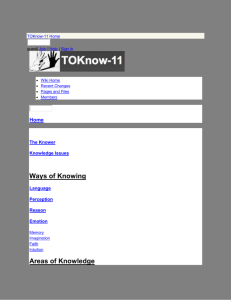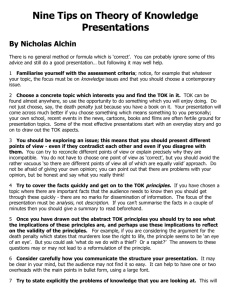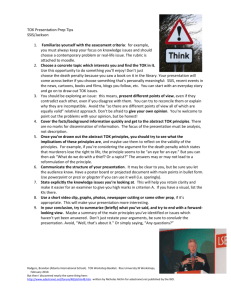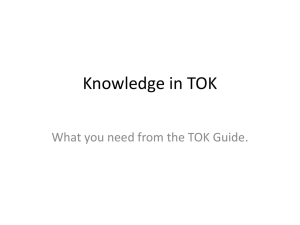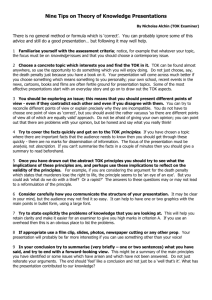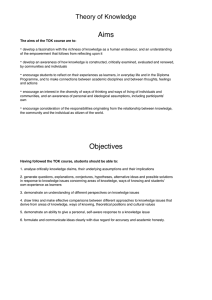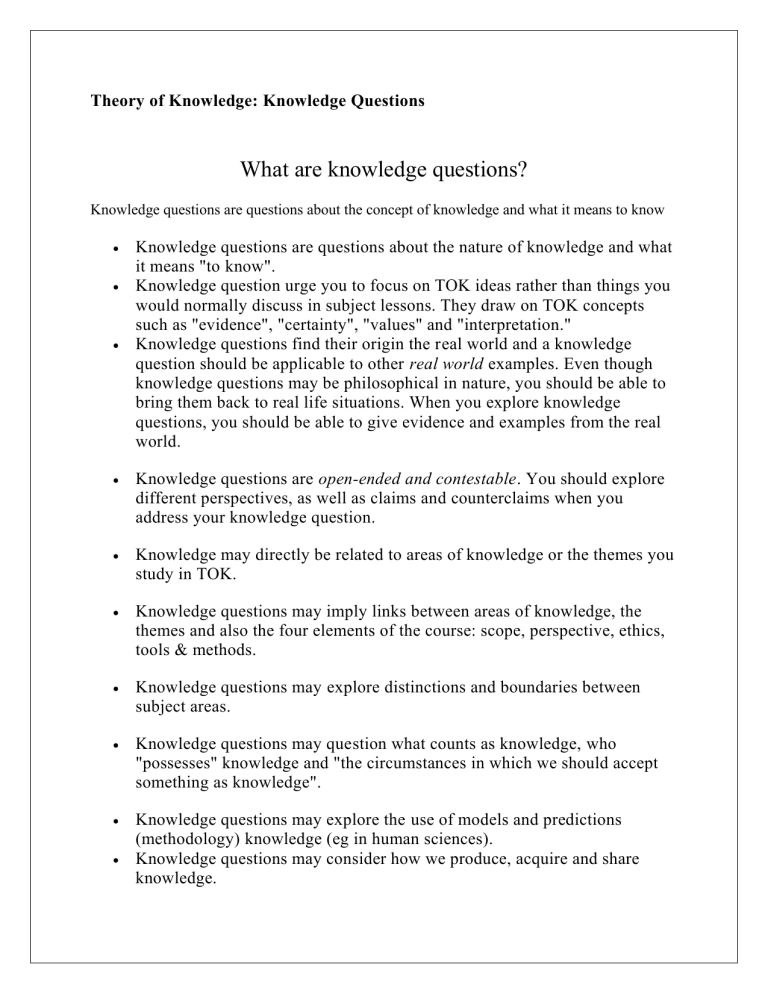
Theory of Knowledge: Knowledge Questions What are knowledge questions? Knowledge questions are questions about the concept of knowledge and what it means to know Knowledge questions are questions about the nature of knowledge and what it means "to know". Knowledge question urge you to focus on TOK ideas rather than things you would normally discuss in subject lessons. They draw on TOK concepts such as "evidence", "certainty", "values" and "interpretation." Knowledge questions find their origin the real world and a knowledge question should be applicable to other real world examples. Even though knowledge questions may be philosophical in nature, you should be able to bring them back to real life situations. When you explore knowledge questions, you should be able to give evidence and examples from the real world. Knowledge questions are open-ended and contestable. You should explore different perspectives, as well as claims and counterclaims when you address your knowledge question. Knowledge may directly be related to areas of knowledge or the themes you study in TOK. Knowledge questions may imply links between areas of knowledge, the themes and also the four elements of the course: scope, perspective, ethics, tools & methods. Knowledge questions may explore distinctions and boundaries between subject areas. Knowledge questions may question what counts as knowledge, who "possesses" knowledge and "the circumstances in which we should accept something as knowledge". Knowledge questions may explore the use of models and predictions (methodology) knowledge (eg in human sciences). Knowledge questions may consider how we produce, acquire and share knowledge. Knowledge questions may explore the strengths and limitations of methods and tools at our disposal in the (human) search for knowledge and, perhaps even the truth. Knowledge questions may explore the notion of evidence in areas of knowledge. Knowledge questions may explore who defines, ‘possesses’ and ‘authorizes’ knowledge. Knowledge questions should be explicitly about knowledge Knowledge questions are based on the TOK course and will often contain ‘TOK vocabulary’. Many knowledge questions begin with the words ‘how do we know’, ‘what counts as knowledge in...’, ‘to what extent...’ and words such as ‘belief’, ‘evidence’, ‘justification’, ‘certainty’, ‘culture’, ‘evidence’, ‘explanation’, ‘interpretation’, ‘truth’, ‘values’, ‘experience’ may be part of the knowledge question. Knowledge questions may explore what is knowledge and what is not. Knowledge questions may explore what counts as a fact and what is not. Knowledge questions may explore the issues with dogma, on the one hand, and relativism, on the other, Knowledge questions are not: Knowledge questions do not demand a yes/no answer in the style of a traditional debate. They should not ask subject specific questions (like the ones you may get on a subject exam). The real world, knowledge questions and TOK Knowledge questions find their origin in the real world. The whole point of TOK is that you can apply your analysis of TOK concepts to what you come across in the world around you. This makes TOK quite different from a philosophy course. For example, you may have read an article on driverless cars and the way they are programmed to make ethical decisions (i.e. in some "emergency" situations, whereby the car may hit either one or another person, the car will need to "decide" which lives to value over others). This is an interesting topic, which could make you wonder, for example, whether the life of the passenger in the driverless car rather than a pedestrian is more worth saving. You could have a very interesting debate about this, but that is not quite an exploration of a knowledge question. A good knowledge question, based on the real world scenario of the driverless cars, could be: "In what way do moral judgments differ from other kinds of judgments?”. This question is broader and can applied to other real life situations as well. This question allows you to explore the foundations of moral judgment (and set ethical principles), for example. This knowledge question is also broad enough to apply to other scenarios, such as real-life cases on euthanasia or GM babies. Through this knowledge question, you can also explore other types of judgment (eg aesthetic) in contrast with moral judgment. In short, although knowledge questions are quite abstract and contain "TOK terminology", you should be able to relate them to a range of real-world examples. You can use these examples to provide evidence for your claims when you explore the essay question. Examples of Knowledge Questions How do we know if a source or claim can be trusted? How do we know what is morally right or wrong? How do we know what our conclusions rest on? How do we know if results are accurate? Is Mathematics present in Nature? What does this imply? How reliable is ‘proof’ in the Natural Sciences? Are the human ‘Sciences’ really Science? Under what circumstances can we say that something is "true" in ..(AOK)? How useful is knowledge gained in History? Does knowledge have to be useful? What is Scientific about Science? How is a subject defined – are there disagreements? Where are the boundaries of your subject? What does your subject have in common with other subject areas? Why is your subject area clustered in a specific Area of Knowledge? How should the various Areas of Knowledge be structured in a diagram, and why? Does the word ‘truth’ have different meanings in different contexts? What are the best grounds for saying that we know something rather than believe it? In what ways can we overcome problems of knowing to arrive at an understanding of things as they really are? How do provisionally accepted but distrusted beliefs become ones we are certain are true? Are there areas where it is not necessary to rely on one’s experience and culture to understand something? To what extent can we understand knowledge claims from a different culture? How important is the role of value judgments in different areas of knowledge? In what ways and areas would the absence of experts most severely limit our knowledge? Under what circumstances should we ignore the opinions of experts in the various areas of knowledge? On what basis might we decide between the judgments of experts if they disagree? To what extent is the knowledge that experts possess transferable? To what extent do different areas of knowledge incorporate doubt as a part of their methods? Under what circumstances might doubt undermine the construction or acquisition of knowledge? Why is the possibility of doubt needed for knowledge? Since doubt can be taken to be lack of convincing support for a claim, how can this lead to a situation in which the claim has convincing support? What counts as evidence in various areas of knowledge? How important is visual or perceivable proof in the natural sciences? Under what circumstances should we go beyond available evidence in the production of knowledge in ...? To what extent are we obliged as knowers to provide evidence for our beliefs? How can we know when we have sufficient evidence? What could be the value of an unsupported belief? When is quantitative data superior to qualitative data in describing a phenomenon? How do we deal with experiences and evidence which contradict or appear to contradict our theories? To what extent does the methodology of an academic discipline remain constant? To what extent does the methodology of an investigation limit or determine the outcomes that are possible? Why might we be more concerned with process rather than product in the search for knowledge? Is there always a clear distinction between content and methodology? To what extent does truth exist in each area of knowledge regardless of whether we can recognize it? To what extent is knowledge dependent upon having absolute distinctions between what is true and what is false? How difficult is it to establish universal truths in various areas of knowledge? How might the concept "fact" differ between areas of knowledge? Are there viable universal criteria for measuring progress that are applicable in all areas of knowledge? To what extent is the degree of progress in an area of knowledge proportional to the value of that area? Which criteria are most useful in measuring progress? How might progress in various areas of knowledge be problematic? To what extent should academic disciplines be ranked according to their usefulness? Why can new historical or scientific or ethical theories explain the same events in completely different ways to old theories? What does it mean to „expand‟ knowledge in ethics as opposed to knowledge in art? In the construction of a model, how can we know which aspects of the world to include and which to ignore? What aspects of the world are not amenable to representation by models? How is new knowledge acquired through the use of models? Since a model is, strictly speaking, false how can it lead to knowledge traditionally thought of as being true? In what ways does language affect how we interpret the world? Might the language(s) we speak affect how we understand ideas? To what extent can we distinguish between rational and emotional inputs into decision-making? What is the role of reason (or emotion) in trying to reach truth? What does it mean to ‘rationally criticise’ a knowledge claim? To what extent can reason operate in isolation from other ways of knowing? What is the role of reasoning in making claims beyond our immediate experience? Are there limits to what we can learn about the world through perception? How can we address the problems of perception using reason? How can language be used to persuade and manipulate people in their beliefs? How can our expectations affect how we perceive the world? What is the scope, and what are the limits of sensory information in different areas of knowledge? What kinds of truth are the arts capable of expressing? To what extent are the insights available from the appreciation of a work of art dependent upon the intentions of the artist? What could be meant by artistic truth? What might be meant by a ‘lie’ in the context of an artwork? To what extent are the limits of art defined by morality? Do the arts allow us to discover truths that are difficult to express in straightforward language? To what extent should, or can, value-laden language be avoided in the writing of history? To what extent can the use of reason bring us closer to the truth in history? To what extent does the use of language in history influence our understanding of the past? To what extent is historical reasoning dependent on the language used by the historian? How do moral judgments differ from other types of judgment? Is there an analogue to the appeal to experiment in the natural sciences by which ethical claims can be tested (such as, for example, appeals to ethical intuitions)? To what extent can we use reason to evaluate two competing ethical systems? Are there ethical claims that are true regardless of what anyone thinks of them? How can we be sure that scientific evidence gained through the use of technology is genuine? How does a scientific explanation distinguish between correlation and causation? How can we know when we have a good scientific explanation? Is it true that all scientific beliefs are held provisionally and is this what makes science unique? How does the scientific method allow scientists to develop explanations? Is there an equivalent method in other areas of knowledge? What are the strengths and limitations of quantification in the human sciences? How can we distinguish causal relationships from mere correlation? Are there general laws that describe human behavior? Are there areas of human experience which cannot be quantified? If so why? How can we draw a clear line between fact and interpretation in history? How does perception work to actively interpret events in History? Does our interpretation of knowledge from the past allow us to reliably predict the future? Are mathematical statements true because we define them to be so, or because we discover them to be so?
